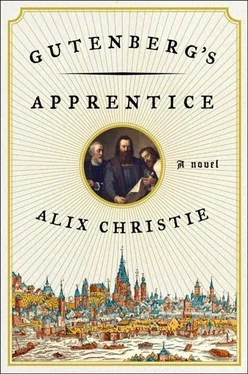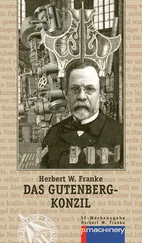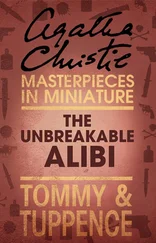“You followed in his footsteps, anyway,” the abbot says.
Peter’s eyes caress the deckled paper of the pages peeking out from every case. The ink on every one is just as glossy as the day he printed it, he thinks. It is as if his youth is held — forever fervent, charged — between two leather-covered boards.
“He would be proud of you, I think,” the abbot hazards.
Would he? Would he truly? Would Peter have allowed it, even if he had been? Loss and shame swirl suddenly, unstoppered after all this time.
“I’m not so sure.” Even now he cannot say with certainty: he never really grasped what drove the man. He knew him best — and still. The person who had stamped his life indelibly remained opaque and inaccessible somehow.
“You were His instruments,” the abbot says, in reassurance. “As are we all.”
Peter looks into the young man’s eyes. A mighty sword, the master called that Bible, swinging it above his head that autumn, thundering and braying. He was a force of nature, surely. How Gutenberg sent all those critics packing — the officious priests and thin-skinned guildsmen, even the archbishop. He refused to blink. That was the measure of the man, his mighty faith — in God, or in himself. It was his greatness, as the thing that they had done together too was truly great — stupendous. Yet Peter’s bitterness, for all these years, has hid this truth from sight.
Trithemius is leaning toward him, fingers lightly brushing Peter’s hand. “You look quite tired,” he says. “The chapel should be open, if you’d like to pray.”
CHAPTER 3: WEDNESDAY AFTER THE NATIVITY OF THE BLESSED VIRGIN
11 September 1454
THE FIRST WEEK is the trading week, the second one of reckoning. The traders go from stall to stall with their fat ledgers, totting up their debts against their sales. When it goes right, no more than a few coins are passed, but a great deal of libation has changed hands. The whole thing ran on trust, Fust had explained to Peter years before. A man’s word was his bond: any debts were carried over until the next fair, or the next.
The final night fell not too long before the feast day of Saint Matthew, the patron saint of those who keep accounts. By then the endless work and wine had left the buyers and the sellers hollow-cheeked and yearning for their homes. The master would remain in Frankfurt for the Reichstag in the hope of selling the remaining Bibles to the nobles. Fust ordered Peter to stay, too, to pocket the deposits and be sure his partner didn’t cheat him. Peter only shook his head and balanced on the rope stretched between them, tighter now than it had ever been before. Thank God his fellows from the workshop had fetched up at last, halfway through the tumult and the revels. Keffer, Ruppel, and young Götz and even Mentelin, Lord bless them all. They’d meet that night aboard the drinking boat anchored beside St. Leonard’s Gate.
But first Fust required the three of them to meet and settle up. Peter and the master headed for the Haus zur Ecken, where the goldsmiths lodged, once all their barrels had been packed with the last quires. They took the long way through the Corn Market so that Gutenberg could stop for some fresh clothes. He would dine well that night among the retinue of the archbishop, where he had found a bed and laid his eiderdown.
Before they hit the Mainzer Hof they stopped, attracted by the lights and crowd. “Let’s have a look,” the master said, and they moved closer to the giant cages covered in dark tarps, from which came hisses and strange moans. A boy with a long stick was prodding something hidden by the tarp between the bars. The showman came in haste around and cuffed him, and the crowd booed and complained. “Then pay your copper!” said the man, and Gutenberg stepped forward.
“A gentleman, at last!” The circus master smiled. He waved them in and pocketed their coins and lifted up the tarp. The world went dim. “This here’s from the far Indies,” he whispered. Curled in a corner of the cage, his huge head resting on his paws, a giant cat opened one listless eye. His fur was golden, striped with black; his tail was thick as any rope used on the Rhine.
“What do they call it?” Peter asked, drawn by the beauty of the beast, imagining its speed. How had they laid their hands on such a thing?
“A tyger.”
“Stand back!” the man warned as the cat sprang up and showed its gleaming teeth. Its fur was soft and rich in appearance, yet worn in places. It seemed to Peter as it padded toward them that it looked right through him — did not see him, but the forest out of which it came, before it paced around the cage once more and dropped back like a sack. “I’ve got an oliphant as well,” the fellow said, and led them wondering to the other cage. So huge a thing they’d never seen nor even dreamed of: as tall as the Mainz wall it seemed, and just as thick, all gray and knobbly, with a snake in place of a nose. It filled the space and pressed against the bars and looked like something ancient. “They say the Turk used these to pull his cannon,” said the man, and Gutenberg gave a sharp laugh. “No doubt,” he said, and reached to feel the thick, dry hide. The thing had tusks and tiny eyes and sloping shoulders Peter could imagine hitched to those vast tubes of iron. He’d thought that he would be amazed to see these rare, exotic creatures from the East, but felt instead an obscure sorrow.
“Some beasts, eh!” said the master as they moved away. “Such things as no one’s ever seen, in Frankfurt or in any other place, eh Peter?” He grinned and cracked his knuckles. “We got the best of our old beast now too, lad, didn’t we?” He slung his arm around his foreman’s neck and squeezed him. Peter laughed out of the sheer delight of living at so marvelous a time. “Indeed.” He smiled, and pictured that old humpbacked Bible Gutenberg had borrowed from St. Christopher’s two years before. The master dropped his arm, and they walked on.
His father was waiting for them in a large front room. Jakob was there too, curled in a chair, and Peter sensed the master’s hackles rise.
“What’s this?” said Gutenberg, but Fust just gestured that they both sit down.
“I asked you here to be quite clear in our accounts,” his father said, taking off his glasses.
“We’ve now sold fifty, plus the hundred you already sold.” The master shrugged his cloak off. He nicked his chin at Peter, as if he ought to reel off the new sales. But Jakob had the pledges in his safe — which Fust now brandished in a sheaf in his large hand.
“I know. But any way I count it, we do not come out ahead.”
Fust’s eyes went back and forth between them, but Peter could read nothing in them.
“It’s not enough.” His father was still speaking evenly. “I will not throw good money after bad.”
“We’ll pull it in,” the master snapped. “Seven thousand at the very least, as we had reckoned.”
“While you charge five against that in your costs.” His father’s lips curled. “Leaving less than two thousand that we split — and I owe easily that much, on your account.” His face had hardened as he spoke.
“You act as if there is no more,” said Peter heatedly, “when you know there will be more income from our own indulgence, and deposits on the psalter.” His father did not even twitch; he stood there stolid and unmoving. A rush of blood filled Peter’s head. The man had made his mind up.
“Johann.” The master sprang to his feet and raised his hands. “Let’s not be rash. We haven’t started to recoup what it will bring. The kaiser’s coming — think of what that means!”
“You and your promises.” Fust’s voice went low; his eyes were glittering. “You promised everything and crept behind my back the whole time. The missal and the prophecy and the indulgence — and now the kaiser, by your leave! I do not trust a word out of your lips.”
Читать дальше












